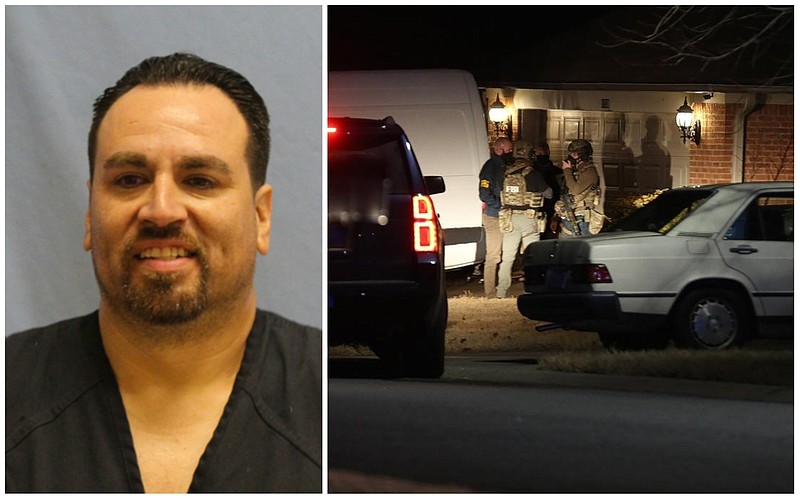The second of two Arkansas men arrested after a riot at the U.S Capitol Jan. 6 was brought Tuesday before a federal judge in Little Rock for his initial appearance to hear the charge he is facing in connection with the melee.
Peter Francis Stager, 41, of Conway, was charged Thursday in federal court in the District of Columbia with one count of obstructing a police officer from his duties during a civil disorder, according to a complaint, following accusations that he was the man caught on video beating a police officer with a pole to which was attached an American flag as rioters streamed up the steps of the U.S. Capitol. The rioters breached security and flooded into the building in an attempt to stop the certification of electoral votes that showed President-elect Joe Biden as the winner of the 2020 presidential election.
Stager appeared Tuesday before Chief U.S. Magistrate Judge J. Thomas Ray at the Richard Sheppard Arnold Federal Courthouse in Little Rock via video link from the Pulaski County jail where he has been held for federal authorities since his arrest last Thursday by the FBI and Conway police at an attorney's office in Conway.
[RELATED: Full coverage of elections in Arkansas » arkansasonline.com/elections/]
Five people died in the riot, including a Capitol Police officer who was hit in the head with a fire extinguisher and a woman who was shot by a Capitol Police officer as she attempted to enter the House Speaker's Lobby through a window that had been smashed a few moments earlier. More than 100 people have been arrested by the FBI thus far.
Stager said little during the eight-minute hearing, answering only "yes, Your Honor" or "no, Your Honor" to direct questions from Ray. His attorney, Lauren Elenbaas of Conway, requested a detention hearing for her client to be held in Arkansas' Eastern District, rather than Washington, D.C., where the charge against her client originated.
After outlining the charge against him, Ray explained the process to Stager and his rights under that process, taking care to ensure that the defendant understood what he was told. Stager, through his attorney, waived his right to a preliminary and identification hearing. Ray explained some of Stager's options available under federal rules of criminal procedure that dictate how the process is to proceed.
"There is a way for you to plead guilty to the charges against you before a United States district judge in the Eastern District of Arkansas and then have that judge sentence you on those charges," Ray said. "However, in order for you to exercise that right you must first obtain the approval of the United States attorneys from both the Eastern District of Arkansas and the District of Columbia."
If Stager goes to trial, according to the U.S. attorney's office, that trial will be held in federal court in Washington D.C.
Assistant U.S. Attorney Stacy Williams told Ray that the U.S. attorney's office was requesting that Ray be held for trial.
Ray ordered Stager held until a bond hearing, scheduled for Friday at 1 p.m. to determine whether he will be eligible for pre-trial release.
Explaining the bond hearing process, Ray told Stager that he would be held in jail until the hearing, at which time he could be eligible to be released under certain conditions until he is put on trial.
"Mr. Stager, the United States is requesting that you be detained in this case," Ray said. "I want to make sure you understand that no decision has been made by this court with regard to whether you should be released or detained. You're strictly being detained now because the government has the right to have you detained until that hearing."
Ray explained that during the hearing, the U.S. attorney's office would present evidence in support of its contention that Stager should remain in jail until he is tried and his defense attorney would present evidence in support of his release until trial.
"After I've heard all of that evidence, I'll make a determination with regard to release or detention in this case," Ray said.
If convicted on the charge of civil disorder, Stager could face a maximum penalty of five years in federal prison. It is unknown if additional charges may be pending. Prosecutors have been filing complaints as soon as possible so people can be arrested. Then those initial complaints are often amended to include additional charges.
One other Arkansan, Richard "Bigo" Barnett, of Gravette, was arrested in connection with the riot. Barnett became internationally known after a photograph of him with a foot on a desk in House Speaker Nancy Pelosi's office went viral. He faces three federal charges, the most serious one for being in the Capitol with a dangerous weapon (a "stun gun"). He faces a maximum sentence of 10 years on that charge, and a maximum sentence of 11.5 years on all three charges.
Barnett was initially ordered released on $5,000 bond by Chief Magistrate Judge Erin L. Wiedemann of the federal court for Arkansas' Western District, but on Friday night, Mary L. Dohrmann, assistant U.S. attorney for the District of Columbia, filed a motion for an emergency stay of Wiedemann's order along with a motion to have Barnett transferred to Washington for further legal proceedings.
Chief Judge Beryl A. Howell signed the order later that night and ordered U.S. marshals to transfer Barnett to the District of Columbia "forthwith."
Information for this article was contributed by Bill Bowden of the Arkansas Democrat-Gazette.
